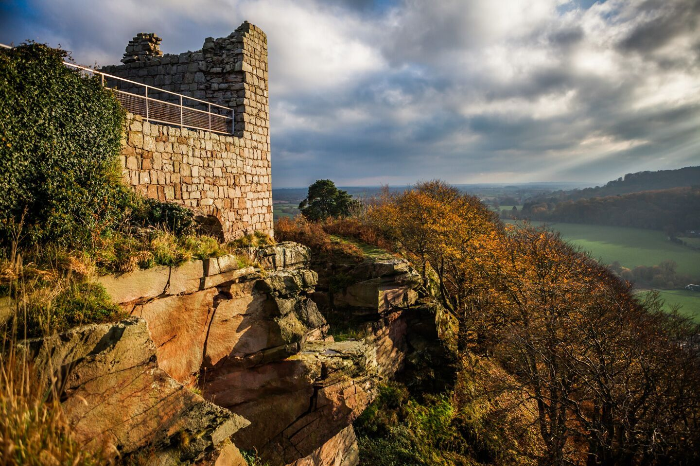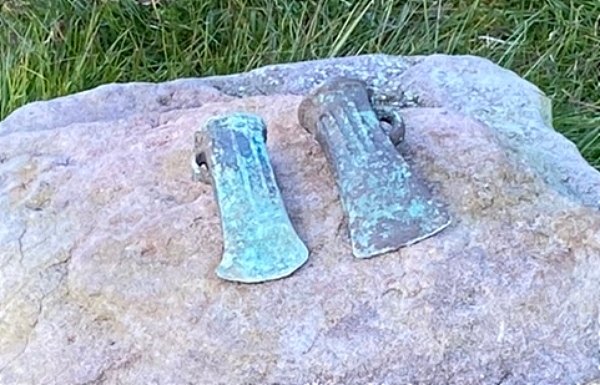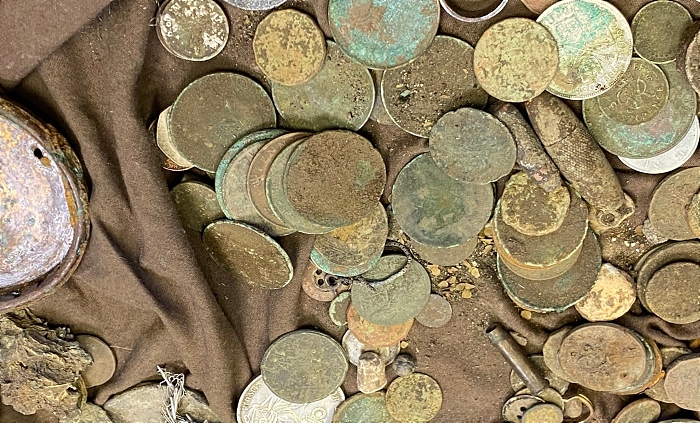
A “nighthawking” gang has been sentenced after admitting metal detecting at historic Cheshire monument, Beeston Castle.
The men appeared at Chester Magistrates for sentencing today (May 7) following an investigation by Cheshire Police, Historic England and South Yorkshire Police.
All five were handed five-year criminal behaviour orders which prevents them from metal detecting at any English Heritage site England and Wales – a first for Cheshire and the North West.
They were ordered to forfeit all artefacts and their metal detectors which have an estimated value of up to £1,000 and above.
Francis James Ward, 32, of Dingle Drive, Droylsden, admitted taking an bronze age axe heads, coins and other metal artefacts from Beeston Castle between 13 and 30 December 2019. He also admitted producing a small quantity of cannabis. He was ordered to pay £1,430 court costs plus a £85 surcharge.
Daniel James Lloyd, 33, of Beech Avenue, Droylsden, admitted taking bronze age axe heads, coins and other metal artefacts from Beeston Castle between 13 and 30 December 2019. He was handed £600 fine plus a £85 surcharge.
John Andrew Lorne, 29, of Sunnyside Road, Droylsden, admitted taking bronze age axe heads, coins and other metal artefacts from Beeston Castle between 13 and 30 December 2019, and removing coins and metal artefacts from Roche Abbey between 28 and 30 December 2019. He was ordered to pay £1,760 plus a £85 surcharge.
Gary Flanagan, 33, of Winton Avenue, Audenshaw, admitted taking coins and metal artefacts from Beeston Castle and Roche Abbey between 13 and 30 December 2019. He was handed £1,100 fine plus a £85 surcharge.
Curtis Barlow, 32, of The Quadrant, Droylsden, admitted taking coins and metal artefacts from Roche Abbey between 13 and 15 December 2019. He was handed a £572 fine along with £85 surcharge.
The men’s illegal activities were unearthed when holes were found in the grounds of Beeston Castle and Roche Abbey, both historic sites in the care of English Heritage.

Further information led them to Ward and on New Year’s Eve, officers from Cheshire executed a warrant at his Drolysden home.
This then led officers to Lorne and his home was searched during a warrant at which a number of items were seized.
Both men were arrested and interviewed while mobile phones and other devices were seized.
When analysing their phones, officers discovered both men were part of a nighthawking WhatsApp group, leading to the arrest of Lloyd, Barlow and Flanagan.
PC Ashley Tether, from Cheshire Police’s Rural Crime Team who led the investigation, said: “The theft of historic items and the damage caused to scheduled monuments and listed buildings is an assault on our history and the impact on the historic ground they have damaged should not be underestimated.
“Although no exact value can be determined for the artefacts taken, they are a piece of national history that help us to understand our past.
“Once these items are lost or damaged they can’t be replaced and we lose the context and the story that may have helped us to understand our ancestors better.
“The items these men took for their own gain are part of our rich history and need to be protected which is why we embarked on a lengthy and complicated investigation with Historic England and South Yorkshire Police Rural Crime Team.
“These men are now barred from metal detecting near historic sites in England and Wales and if they want to do so on any other land, they need to show the land owner a copy of the CBO before conducting metal detecting activity – if you see them not adhering to this restriction you can report it to police on 101. Breaching such orders can result in a prison sentence.”

Mark Harrison, Head of Heritage Crime Strategy for Historic England, said: “A decade ago, we did not have the skills and techniques necessary to investigate this form of criminal behaviour.
“We have now developed the expertise, capability and partnerships to identify and prosecute the small criminal minority of nighthawks.
“The overwhelming majority of metal detectorists comply with the legislation and codes of practice.
“When thieves steal artefacts from a protected archaeological site, they are stealing from all of us and damaging something which is often irreplaceable.”
English Heritage Properties Curator Win Scutt, said: “Illegal metal detecting robs us of our past, and whilst this prosecution is good news, sadly the damage incidents like these cause can never be repaired.
“Unlawful attacks like these can cause such insight to be lost forever.
“The ground beneath us is a wonderful library of our past.
“Holes dug by metal detectorists cut through these unread pages destroying all the information forever – just to tear out a precious trinket that will usually end up lost in a private collection.
“English Heritage is dedicated to preserving these nationally important archaeological sites.”


















Recent Comments